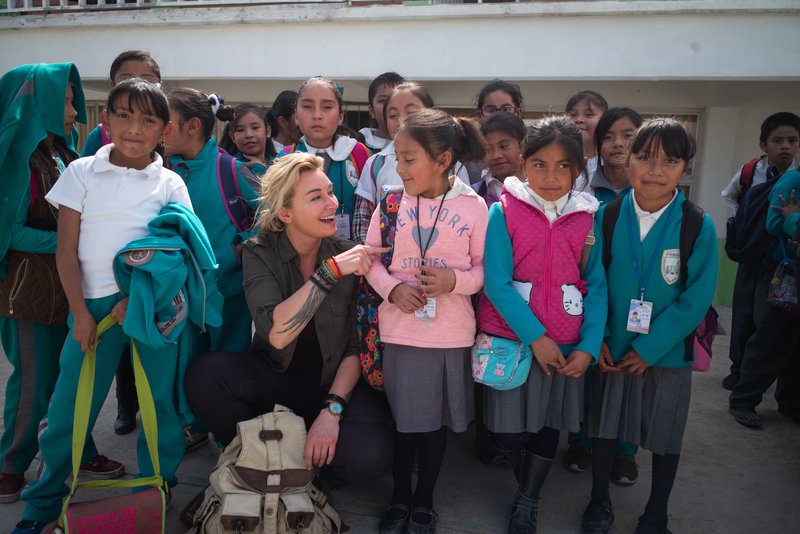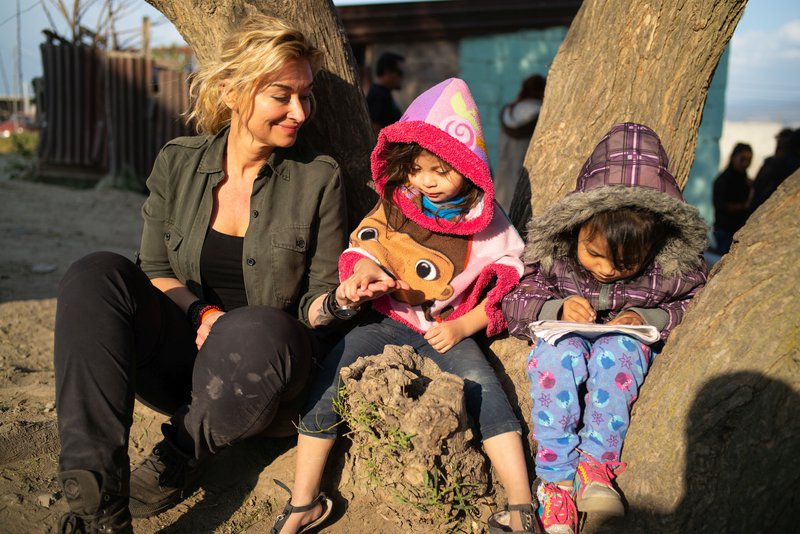CHILDREN FROM THE TRASH DUMP UNDER THE CARE OF CARMEN
Sports, mathematics and Spanish. All of this is the “office” under a tree in the area. Here, the children of pepenadroes can plan a better future.

THE HEAPS OF TRASH ARE NOT ONLY SEARCHED THROUGH BY ADULTS. YOU CAN SEE FAMILIES WITH CHILDREN, EVEN THREE-YEAR-OLDS.
At dawn, they climb up onto the mounds of trash and look for things they can sell. PET bottles, cartons, metal. The child pepenadores, the informal trash collectors in Mexico City, live without electricty or running water and they often have to help their parents in the dump instead of learning and playing. This is how whole families live here - they rummage in the waste from 4 am to dusk, and often with flashlights at night. There is no other job here.
The UNAWEZA Foundation in cooperation with the local organization Alianza por la Inclusion Mundial AC will provide the children with school kits, sports and educational activities. For them, education is the only way to escape the sad reality to a better life.
Chimalhuacan is one of the many neighborhoods on the outskirts of Mexico City. It seems to be close, only 20 kilometers from the capital. However, covering this distance by public transport can take up to two hours. Many residents cannot afford this trip anyway. And there's only one job in the neighborhood: garbage. Informal, unofficial, no benefits or insurance.
Some 500 tons of waste end up in the Chimalhuacan landfill every day. Almost everyone in this area makes a living from the informal segregation. Heaps of garbage are combed through not only by adults. You can see families with children, even three years old. The little ones play, eat and work in the landfill. It's illegal and it's dangerous. Neither they, nor the adults have any equipment, not even protective gloves, and they work amidst decaying waste, chemicals, and syringes.
Toxic fumes hover over the mountains of garbage. However, if the family is large, every pair of hands is useful. On average, you earn 160 pesos a day here, which is about 30 zlotys. The finds that can be segregated are bought by the group leader, who then sells the goods for a much greater price. It’s a constant struggle, but working in the landfill is the only source of income for pepenadores. And at the same time a source of shame and stigma. “Because they stink terribly,” say the kids from the local school. “We don't want to play with them.”

“It was hard for me to get used to this job because of the smell and rats. There are also cockroaches and aggressive dogs. They are looking for food,” says 15-year-old Miguel, who cannot study because he has to work. Like most of the Chimalhuacan people, his family has no access to sewage, running water, or any infrastructure.
"They do not officially exist, so the government does not recognize them either," explains Carmen Azucena Villalobos Martinez, founder of the Alianza Mundial AC social organization, which provides sports and educational activities for children in the area every afternoon.

She is a PE teacher, daughter of a single mother, and knows what it means to be hungry. She also knows that a difficult childhood does not have to determine the rest of someone’s life. Therefore, together with Carmen, we want to offer the Children of the landfill a better future, to show them alternatives. “This is the only way they have a chance to break this vicious circle. Otherwise, they will be working in garbage and with no prospects from generation to generation.” “Babies of pregnant mothers who work in the landfill weigh 1.8 kg after birth. On average, people here live 40, 50 years. Short, right?” adds Carmen Azucena.
There are almost 150 mentees here. Many of them, when they attend afternoon sports, self-defense, math or reading activities, have not eaten anything since the morning. They live in extreme poverty, with no prospects, often in families where they experience violence. A group of kids gathers several times a week to forget about what awaits them or their families on the slope opposite, at the garbage dump. Learning, having fun and sports are the only escape routes to another world.
The UNAWEZA Foundation finances sports and school supplies for kids who participate in the sports program. Carmen and the organization are responsible for coordinating activities on site. We would like these kids to find out that sports and science can change their lives. We believe that with your help it can become possible.
All of this is possible thanks to the extraordinary people who participate in the TICKET TO A BETTER LIFE project.
Join the group of FRIENDS of Children from the landfill.
By changing one person's life, you change the whole world!
TOGETHER WE CAN GIVE THEM WINGS!
WHO DO WE HELP?
KABULA AND CHILDREN WITH ALBINISM
Kabula, like many people with albinism in Tanzania and other African countries, lived in constant fear for her life. Today she is studying and planning to study law, in order to support people who do not have the strength and resources to defend themselves in the future. Help change the lives of mor
Learn more